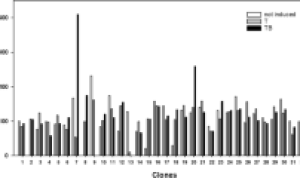Traci Watson a senior editor for news and research highlights atNature. She is based in Washington DC.
Search author on:PubMedGoogle Scholar
Cancer cells (red, with their nuclei stained blue) grow thin tubes to siphon mitochondria out of nerve cells (green). Credit: Simon Grelet and Gustavo Ayala
Cancer cells turbocharge themselves by stealing the energy-producing units from neurons in tumours, scientists report today inNature1. This act of thievery seems to give cancer cells a boost to help them survive when they metastasize, or spread to distant organs.
The findings show that cancer cells siphon off neurons’ mitochondria —organelles that generate most of a cell’s energy— through ultrathin tubes that grow between the two types of cell. The purloined mitochondria increase cancer cells’ ability to withstand the stress of shooting through blood vessels during metastasis.
“Now we have a new culprit for metastasis, which means we have a new target to block metastasis,” says study co-author Simon Grelet, a cancer neurobiologist at the University of South Alabama in Mobile. “And metastasis is what make cancers so deadly.”
Scientists have long known thatcancer co-opts the nervous system to fuel its growth. To learn more about the process, Grelet and his colleagues worked with mice that had a rodent version of aggressive breast cancer. The authors treated the mice with a chemical agent that blocks nerve function and saw that the metabolic activity in the animals’ cancer cells fell, confirming that neurons influence tumours’ metabolism.
Cells are swapping their mitochondria. What does this mean for our health?
Cells are swapping their mitochondria. What does this mean for our health?
Observations of cancer cells growing in a laboratory dish revealed that they extend drinking-straw-like tubes through which they drain neurons’ mitochondria. Other experiments showed that cancer cells with ‘stolen’ mitochondria generate more energy than do cancer cells without them.
The researchers wanted to see how the turbocharged cancer cells would fare during a simulated trip from an original ‘primary’ tumour to a metastatic site in a new tissue. So they pushed some cells through a needle and syringe to simulate the buffeting that they would encounter in the blood stream during the journey, and exposed others to hydrogen peroxide to mimic the potentially damaging chemical environment they would meet. The team found that the cells were much more likely to survive than those lacking extra mitochondria.
Gain free access to this article, as well as selected content from this journal and more onnature.com
doi: https://doi.org/10.1038/d41586-025-01941-z
Read the related News & Views: ‘Neuronal transfer of mitochondria to tumour cells promotes cancer spread’.
Hoover, G.et al.Naturehttps://doi.org/10.1038/s41586-025-09176-8 (2025).
Cancer cells ‘poison’ the immune system with tainted mitochondria
Cells are swapping their mitochondria. What does this mean for our health?
How cancer hijacks the nervous system to grow and spread
Breast-cancer cells enlist nerves to spread throughout the body
Cancer cells have ‘unsettling’ ability to hijack the brain’s nerves
Neuronal transfer of mitochondria to tumour cells promotes cancer spread
Change of venue: fission-yeast cell-division cues actually initiate in the nucleus
Nerve-to-cancer transfer of mitochondria during cancer metastasis
Can a pill replace exercise? Swigging this molecule gives mice benefits of working out
How to keep weight off after obesity drugs
Mitochondrial molecule has unexpected role in tissue healing
The dynamics and geometry of choice in the premotor cortex
Eureka! The brain science behind lightbulb moments
Neuronal transfer of mitochondria to tumour cells promotes cancer spread
Founded in 2018, Westlake University is a new type of non-profit research-oriented university in Hangzhou, China, supported by public a…
The University of Toronto now recruiting for the Eric and Wendy Schmidt AI in Science Postdoctoral Fellowship. Valued at $85,000 CDN per year.
The Integrated Science Lab (IceLab) offers three postdoctoral scholarships that will be affiliated with one of six possible multidisciplinary projects
Aim to a global leader in materials science research society, and create a diverse, innovative, and collaborative research environment
Department of Frontier Materials, Suzhou Laboratory
The Max Planck Institute of Molecular Cell Biology and Genetics (MPI-CBG) in Dresden, Germany, is seeking an outstanding individual to fill the po…
Max Planck Institute of Molecular Cell Biology and Genetics


